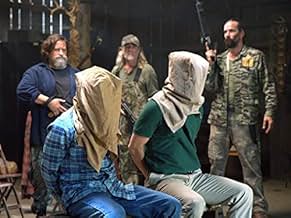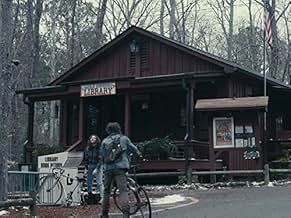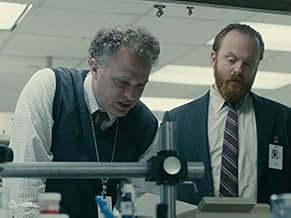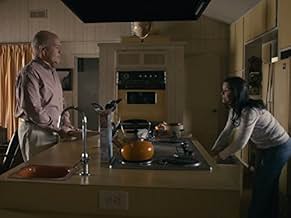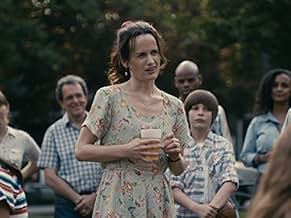"Una mirada a cómo un perfilador del FBI ayudó a dar caza al terrorista ""Unabomber"" Ted Kaczynski.""Una mirada a cómo un perfilador del FBI ayudó a dar caza al terrorista ""Unabomber"" Ted Kaczynski.""Una mirada a cómo un perfilador del FBI ayudó a dar caza al terrorista ""Unabomber"" Ted Kaczynski."
- Premios
- 2 nominaciones en total
Explorar episodios
Opiniones destacadas
While the treatment might have been better.. I thought it was fine. What was amazing to me, the depth of detail, the insight, the development behavioral analysis techniques.. Especially the FBI figuring out when he went to college, and finding the 'writing rules, used by a world renowned Newspaper') to track down Kazinski
That part of it is amazing. I thought this was very informative, and entertaining. I'm glad they focused on the discovering who the Unabomber was rather than focusing on the bloody aftermath of his actions (would have been a cheap way to boost ratings.. The writers and producers 'took the high road' in creating this outstanding insight
That part of it is amazing. I thought this was very informative, and entertaining. I'm glad they focused on the discovering who the Unabomber was rather than focusing on the bloody aftermath of his actions (would have been a cheap way to boost ratings.. The writers and producers 'took the high road' in creating this outstanding insight
I initially thought this might just turn into a FBI vs. Serial Killer standard crime series, however, when we are properly introduced to Ted Kazinscky - it becomes truly gripping. Paul Bettany does an incredible job of playing the role of The Unabomber, Ted Kazincsky: dark, ominous, highly intelligent and manipulative. I was young when the real incidents happened in the 90's, but I felt the series was compelling whilst not straying too far from the truth about this story. I'd recommend a watch.
As a miniseries about an FBI profiler, Manhunt: Unabomber is quite engaging. The series follows the search for the Unabomber, which increasingly focuses on the way he writes, as well as preparation for trial two years later, going back and forth.
The protagonist is a profiler called Fitz (excellent performance by Sam Worthington) who starts off as a seemingly happy family man and two years later is living in a cabin in the woods, giving the audience two mysteries: how was the Unabomber caught, and how did Fitz's life fall apart.
While the story is intriguing, The series insists on an Imitation Game approach in which a brilliant individual singlehandedly solves the problem while everyone fights him at every step.
As with the infamously inaccurate Imitation Game, Manhunt's historical accuracy is doubtful. In fact, I did some research and easily found discrepancies. A New York Times story indicates that there were a number of people, including some outside the FBI, working on the textual clues that the miniseries has Fitz solve almost singlehandedly.
The series portrays Fitz in a formulaic manner. For example, his profiling duties lead him to identify too closely with his target, just like most series about profilers.
There's also an amusing scene where a bunch of men yell at each other while the one woman in the room asks the only intelligent question and becomes a major help to Fitz. This seemed a little too perfect (when you see a scene that perfectly illustrates something, it's often, as in the case of some scenes in Hidden Figures, completely made up). The woman is probably just a composite character, since I read an article saying there were numerous people contributing information that in the series all comes from her.
The only thing the producers have admitted to making up are the meetings with Fitz and the Unabomber. The reason for the first meeting makes no sense, which would be a good reason to have not done it, but the producers wanted to make sure there was a setup for a second meeting in which, in the final episode, Fitz cracks everything wide open. Of course.
The series drifts a bit off course towards the end. One episode leaves the investigation to show us the Unabomber's life, but since the series tight focus on the technical aspects of the investigation didn't make me wonder about the man, it just felt like the investigation grinding to a halt. And the final episode, while generally satisfying, felt far too pat.
Does historical accuracy matter? Overall it is an entertaining series, (although it virtually ignores the mystery of Fitz's downfall as set up in the beginning, which felt like a cheat). Personally, though, I often find the sloppiness of historical truth more interesting than the neat packages we get from Hollywood. I wish the writers had been less interested in creating a hero and more interested in the chaotic, collaborative nature of true investigation.
The protagonist is a profiler called Fitz (excellent performance by Sam Worthington) who starts off as a seemingly happy family man and two years later is living in a cabin in the woods, giving the audience two mysteries: how was the Unabomber caught, and how did Fitz's life fall apart.
While the story is intriguing, The series insists on an Imitation Game approach in which a brilliant individual singlehandedly solves the problem while everyone fights him at every step.
As with the infamously inaccurate Imitation Game, Manhunt's historical accuracy is doubtful. In fact, I did some research and easily found discrepancies. A New York Times story indicates that there were a number of people, including some outside the FBI, working on the textual clues that the miniseries has Fitz solve almost singlehandedly.
The series portrays Fitz in a formulaic manner. For example, his profiling duties lead him to identify too closely with his target, just like most series about profilers.
There's also an amusing scene where a bunch of men yell at each other while the one woman in the room asks the only intelligent question and becomes a major help to Fitz. This seemed a little too perfect (when you see a scene that perfectly illustrates something, it's often, as in the case of some scenes in Hidden Figures, completely made up). The woman is probably just a composite character, since I read an article saying there were numerous people contributing information that in the series all comes from her.
The only thing the producers have admitted to making up are the meetings with Fitz and the Unabomber. The reason for the first meeting makes no sense, which would be a good reason to have not done it, but the producers wanted to make sure there was a setup for a second meeting in which, in the final episode, Fitz cracks everything wide open. Of course.
The series drifts a bit off course towards the end. One episode leaves the investigation to show us the Unabomber's life, but since the series tight focus on the technical aspects of the investigation didn't make me wonder about the man, it just felt like the investigation grinding to a halt. And the final episode, while generally satisfying, felt far too pat.
Does historical accuracy matter? Overall it is an entertaining series, (although it virtually ignores the mystery of Fitz's downfall as set up in the beginning, which felt like a cheat). Personally, though, I often find the sloppiness of historical truth more interesting than the neat packages we get from Hollywood. I wish the writers had been less interested in creating a hero and more interested in the chaotic, collaborative nature of true investigation.
The FBI uses profilers to figure out who their cold case perpetrators are and in this drama our hero develops a whole new form of Forensic linguistics to develop his profile. In the process he is up against the entire FBI bureaucracy who is mired in the old ways and who reject Fitz's new techniques. Even with all that without the brother turning him in there still might not be an end to this case.
The battle of wits between Fitz and the unabomber during their interviews is almost worth the entire series. The unabomber has many ideas that will fit well for many potential jury members and so the FBI wants a confession and not merely going to court with their mountain of evidence.
The ideas presented in this series about linguistics are interesting of themselves, the concepts of just what is meant by freedom for instance resonated with so many people.
I give this a big thumbs up!
The battle of wits between Fitz and the unabomber during their interviews is almost worth the entire series. The unabomber has many ideas that will fit well for many potential jury members and so the FBI wants a confession and not merely going to court with their mountain of evidence.
The ideas presented in this series about linguistics are interesting of themselves, the concepts of just what is meant by freedom for instance resonated with so many people.
I give this a big thumbs up!
Not bad, not bad at all, in my opinion Bettany and Worthington will be Academy Award winners if these show was produced by HBO or another famous trademark. First of all, if you're looking to see desperate violence, gunshots, fights and "flashy violence" these isn't a show for you.Is a thriller, a psychological one, between "The Unabomber" and "Fitz", and the bureaucratic processes in the government agencies that can delay investigations like this. The show have a really slow pace, but it comes alive thanks to the performances of the principal and secondary characters. Will see how the producers develop these show, but the first three episodes are good enough to give these show a chance. Hope ends well.
¿Sabías que…?
- TriviaAs of 2017, the Unabomber's cabin, featured prominently in this series, is on display at the Newseum in Washington, DC.
- ErroresThe real Fitz never met Ted Kaczynski.
- ConexionesReferenced in Terra Ignota: El manifiesto de Unabomber (2021)
Selecciones populares
Inicia sesión para calificar y agrega a la lista de videos para obtener recomendaciones personalizadas
- How many seasons does Manhunt have?Con tecnología de Alexa
Detalles
- Color
Contribuir a esta página
Sugiere una edición o agrega el contenido que falta








